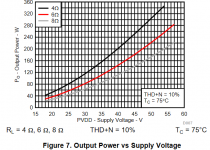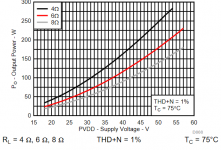I am following several threads about the TPA 3255 and come across a lot of questions related to suitable power-supply-units by less experienced users.
This chip can deliver up to 315 watts per channel and has an efficiency of 90% and better , so if we assume 315 watts x 2 = 630 watts which are equal to 90% then the power required to output this is an input of 700 watts. which the PSU has to deliver .
OR LESS ?
YES because the power required depends on the output power you need or want.
If you look up the datasheet of the TPA3255 at this link :
https://www.ti.com/lit/ds/symlink/t...=https%3A%2F%2Fwww.ti.com%2Fproduct%2FTPA3255
from Texas Instruments you will find a graph of " output power versus supply voltage where you can look up what the voltage you need for the output you want , the range is from 18V to 53.5V D.C.
This is that graph . If you use a slightly higher voltage , say 2 more volts , your output will be perfectly clean provided that your PSU delivers the necesary CLEAN current , which depends on load , type of music played , and a lot of other minor factors .
Now you know the voltage the TPA needs for your output- power.
The current is another story because it depends on the number of channels you have , the kind of music played , but in general terms the PSU should have 20 percent more watts than the sum of the channels to be driven simultaneously , so if you want say 2 channels at 60 watts each which gives 120 multiplied by 120% gives 144 so your PSU should have 150 watts or more , and so on.
This is valid for a class "D" amp , class AB needs a lot more .
With SMPS this should work fine for you provided that it delivers a clean current so consider a filter between the PSU and the amp
With a linear PSU you need high cpacity to avoid sagging rails at 100HZ in Europe and 120HZ in the United States for example.
If you have a linear PSU with a somewhat lower voltage than what you require a good option is to use a boost module to raise the voltage to what you require provided your PSU has the necesary output power and its voltage is between 10 % and about 35 % lowerr than what you need . the allowable booster input current has to be twice the current the amp needs and here as well I recommend a filter between the booster and the amp. Use a booster specified for twice the amps you need as these are quite cheap when bought on AliExpess for examle:
You get this for 10 dollars , or 10,40 euros now .
You can adjust it to the exact voltage you want , and limit the current to whatever you adjust as well.
This chip can deliver up to 315 watts per channel and has an efficiency of 90% and better , so if we assume 315 watts x 2 = 630 watts which are equal to 90% then the power required to output this is an input of 700 watts. which the PSU has to deliver .
OR LESS ?
YES because the power required depends on the output power you need or want.
If you look up the datasheet of the TPA3255 at this link :
https://www.ti.com/lit/ds/symlink/t...=https%3A%2F%2Fwww.ti.com%2Fproduct%2FTPA3255
from Texas Instruments you will find a graph of " output power versus supply voltage where you can look up what the voltage you need for the output you want , the range is from 18V to 53.5V D.C.
This is that graph . If you use a slightly higher voltage , say 2 more volts , your output will be perfectly clean provided that your PSU delivers the necesary CLEAN current , which depends on load , type of music played , and a lot of other minor factors .
Now you know the voltage the TPA needs for your output- power.
The current is another story because it depends on the number of channels you have , the kind of music played , but in general terms the PSU should have 20 percent more watts than the sum of the channels to be driven simultaneously , so if you want say 2 channels at 60 watts each which gives 120 multiplied by 120% gives 144 so your PSU should have 150 watts or more , and so on.
This is valid for a class "D" amp , class AB needs a lot more .
With SMPS this should work fine for you provided that it delivers a clean current so consider a filter between the PSU and the amp
With a linear PSU you need high cpacity to avoid sagging rails at 100HZ in Europe and 120HZ in the United States for example.
If you have a linear PSU with a somewhat lower voltage than what you require a good option is to use a boost module to raise the voltage to what you require provided your PSU has the necesary output power and its voltage is between 10 % and about 35 % lowerr than what you need . the allowable booster input current has to be twice the current the amp needs and here as well I recommend a filter between the booster and the amp. Use a booster specified for twice the amps you need as these are quite cheap when bought on AliExpess for examle:
You get this for 10 dollars , or 10,40 euros now .
You can adjust it to the exact voltage you want , and limit the current to whatever you adjust as well.

